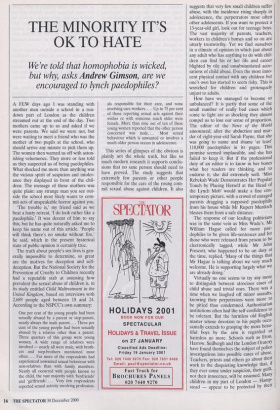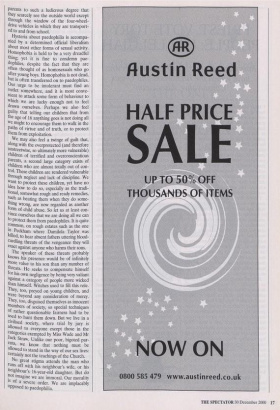THE MINORITY IT'S OK TO HATE
We're told that homophobia is wicked, but why, asks Andrew Gimson, are we encouraged to lynch paedophiles?
A FEW days ago I was standing with another man outside a school in a run- down part of London as the children streamed out at the end of the day. Two mothers came up to us and asked if we were parents. We said we were not, but were waiting to meet a friend who was the mother of two pupils at the school, who should arrive any minute to pick them up. The women then warned us off with aston- ishing vehemence. They more or less told us they suspected us of being paedophiles. What shocked me more than anything was the vicious spirit of suspicion and intoler- ance they displayed in front of the chil- dren. The message of these mothers was quite plain: any strange man you see out- side the school most likely wants to com- mit acts of unspeakable horror against you.
`The trouble is,' my friend said as we beat a hasty retreat, 'I do look rather like a paedophile.' It was decent of him to say this, but he has quite naturally asked me to keep his name out of this article. 'People will think there's no smoke without fire,' he said, which in the present hysterical state of public opinion is certainly true.
The truth about people's sex lives is gen- erally impossible to determine, so great are the motives for deception and self- deception. But the National Society for the Prevention of Cruelty to Children recently had a reputable stab at assessing how prevalent the sexual abuse of children is, in its study entitled Child Maltreatment in the United Kingdom, based on interviews with 2,689 people aged between 18 and 24. According to the NSPCC's own summary:
One per cent of the young people had been sexually abused by a parent or step-parent, nearly always the male parent.... Three per cent of the young people had been sexually abused by a relative other than a parent. Three quarters of this group were young women. A wide range of relatives were involved — nearly all were male, with broth- ers and step-brothers mentioned most often.... Far more of the respondents had experienced unwanted sexual behaviour with non-relatives than with family members. Nearly all occurred with people known to the child, the vast majority with 'boyfriends' and `girlfriends'.... Very few respondents reported sexual activity involving profession- als responsible for their care, and none involving care workers.... Up to 75 per cent of those reporting sexual acts against their wishes or with someone much older were female. More than nine out of ten of these young women reported that the other person concerned was male.... Most sexual behaviour which is unwanted or involves a much older person occurs in adolescence.
This series of glimpses of the obvious is plainly not the whole truth, but like so much modern research it supports conclu- sions that no sane person should need to have proved. The study suggests that extremely few parents or other people responsible for the care of the young com- mit sexual abuse against children. It also suggests that very few small children suffer abuse, with the incidence rising sharply in adolescence, the perpetrators most often other adolescents. If you want to protect a 13-year-old girl, look out for teenage boys. The vast majority of parents, teachers, workers in children's homes and so on are utterly trustworthy. Yet we find ourselves in a climate of opinion in which just about any adult who has anything to do with chil- dren can find his or her life and career blighted by vile and unsubstantiated accu- sations of child abuse. Even the most inno- cent physical contact with any children but one's own has started to seem risky. This is wretched for children and grotesquely unjust to adults.
How have we managed to become so unbalanced? It is partly that some of the small number of really bad cases which come to light are so shocking they almost compel us to lose our sense of proportion. The editor of the News of the World announced, after the abduction and mur- der of eight-year-old Sarah Payne, that she was going to name and shame 'at least' 110,000 paedophiles in its pages. This promise seemed implausible, and she has failed to keep it. But if the professional duty of an editor is to know in her bones what her readers are thinking, and to endorse it, she did extremely well. 'Miss Rebekah Wade Demonstrates Her popular Touch by Placing Herself at the Head of the Lynch Mob' would make a fine con- temporary picture, with a crowd of enraged parents dragging a supposed paedophile from his house while Mr Rupert Murdoch blesses them from a safe distance.
The response of our leading politicians was in the same vein as Miss Wade's. Mr William Hague called for more pae- dophiles to be given life-sentences and for those who were released from prison to be electronically tagged, while Mr John Prescott, who happened to be on duty at the time, replied, 'Many of the things that Mr Hague is talking about we very much welcome. He is supporting largely what we are already doing.' Virtually no one seems to try any more to distinguish between atrocious cases of child abuse and trivial ones. There was a time when we laughed off minor assaults, knowing their perpetrators were more to be pitied than condemned. Authoritarian institutions often had the self-confidence to be tolerant. But the harmless old English master whose devotion to his pupils occa- sionally extends to grasping the more beau- tiful boys by the arm is regarded as harmless no more. Schools such as Eton, Harrow, Sedbergh and the London Oratory have found themselves the subject of police investigations into possible cases of abuse. Teachers, priests and others go about the work in the disquieting knowledge that, if they ever come under suspicion, their guilt, not their innocence, will be assumed. Many children in my part of London — Hamp- stead — appear to be protected by their parents to such a ludicrous degree that they scarcely see the outside world except through the window of the four-wheel- drive vehicles in which they are transport- ed to and from school.
Hysteria about paedophilia is accompa- nied by a determined official liberalism about most other forms of sexual activity. Homophobia is held to be a very dreadful thing; yet it is fine to condemn pae- dophiles, despite the fact that they are often thought of as homosexuals who go after young boys. Homophobia is not dead, but is often transferred on to paedophiles. Our urge to be intolerant must find an Outlet somewhere, and it is most conve- nient to attack some form of behaviour to which we are lucky enough not to feel drawn ourselves. Perhaps we also feel guilty that telling our children that from the age of 16 anything goes is not doing all we might to encourage them to walk in the paths of virtue and of truth, or to protect them from exploitation. We may also feel a twinge of guilt that, along with the overprotected (and therefore unstreetwise, so ultimately more vulnerable) children of terrified and overconscientious parents, a second large category exists of children who are almost totally out of con- trol. These children are rendered vulnerable through neglect and lack of discipline. We Want to protect these children, yet have no idea how to do so, especially as the tradi- tional, somewhat rough and ready remedies, such as beating them when they do some- thing wrong, are now regarded as another form of child abuse. So let us at least con- vince ourselves that we are doing all we can to protect them from paedophiles. It is quite common, on rough estates such as the one In Peckham where Damilola Taylor was killed, to hear absent fathers uttering blood- curdling threats of the vengeance they will exact against anyone who harms their sons. The speaker of these threats probably knows his presence would be of infinitely more value to his son than any number of threats. He seeks to compensate himself for his own negligence by being very valiant against a category of people more wicked than himself. Witches used to fill this role. They, too, preyed on young children, and were beyond any consideration of mercy. They, too, disguised themselves as innocent members of society, so special techniques of rather questionable fairness had to be used to hunt them down. But we live in a civilised society, where trial by jury is allowed to everyone except those in the categories exempted by Miss Wade and Mr Jack Straw. Unlike our poor, bigoted par- ents, we know that nothing must be allowed to stand in the way of our sex lives: certainly not the teachings of the Church. No great stigma attends the man who runs off with his neighbour's wife, or his neighbour's 16-year-old daughter. But do not imagine we are immoral. Our morality is of a severe order. We are implacably opposed to paedophilia.



















































 Previous page
Previous page